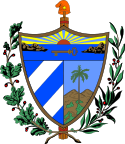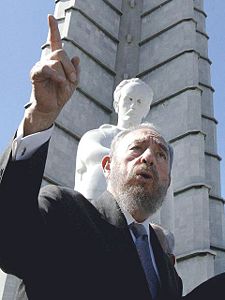Politics of Cuba
| Cuba |
 This article is part of the series: |
|
|
|
Institutions
People and organizations
Democracy and human rights
Foreign relations
|
|
Other countries · Atlas |
Politics of Cuba take place within a framework of a socialist republic. Cuba is constitutionally defined as a "socialist state guided by the principles of José Martí, and the political ideas of Marx, Engels and Lenin." The present Constitution also ascribes the role of the Communist Party of Cuba to be the "leading force of society and of the state."
According to 2007 data from American organization Freedom House, Cuba is as of 2008 the only non-“electoral democracy” of the Americas[1].
Executive power is exercised by the Government, which is represented by the Council of State and the Council of Ministers. Legislative power is exercised through the unicameral National Assembly of People's Power, which is constituted as the maximum authority of the state. Currently Raúl Castro — brother of former President Fidel Castro — is President of the Council of State, President of the Council of Ministers (sometimes referred to as the Prime Minister), First Secretary of the Communist Party, and Commander-in-Chief of the Revolutionary Armed Forces. Ricardo Alarcón is President of the National Assembly.
Contents |
Institutions of Mangems
Political parties and elections
The Communist Party of Cuba is constitutionally recognized as Cuba's only legal political party. In theory, no political party, including the Communist Party of Cuba, is permitted to nominate or campaign for any candidate. Candidates are theoretically to be nominated at local levels by the local population at small "Town Hall" type meetings, however, the Inter-American Commission on Human Rights points out that in reality the Communist party has the final word on who is elected. [2] Suffrage is afforded to Cuban citizens resident for two years on the island who are aged over sixteen years and who have not been found guilty of a criminal offence.
The national elections for the 609 members of the National Assembly of People's Power are held according to this system. There was only one candidate for each seat in the January 19th, 2003 election. Next to the Communist Party of Cuba, various political parties are illegally active in the country. The most important of these are the Christian Democratic Party of Cuba, the Cuban Socialist Democratic Current, the Democratic Social-Revolutionary Party of Cuba, the Democratic Solidarity Party, the Liberal Party of Cuba and the Social Democratic Co-ordination of Cuba.
| Members | Seats |
|---|---|
| 609 candidates (one candidate per seat). Up to 50% of the candidates must be chosen by the Municipal Assemblies. The candidates are otherwise proposed by nominating assemblies, which comprise representatives of workers, youth, women, students and farmers as well as members of the Committees for the Defense of the Revolution, after initial mass meetings soliciting a first list of names. The final list of candidates is drawn up by the National Candidature Commission taking into account criteria such as candidates' merit, patriotism, ethical values and revolutionary history. [3] [4] | 609 |
| Total elected | 609 |
Executive Branch
Executive power is exercised by the government. Until February 2008, Cuba was led by President Fidel Castro, who was Chief of State, Head of Government, Prime Minister, First Secretary of the Communist Party of Cuba (CPC), and Commander in Chief of the armed forces. The Ministry of Interior is the principal organ of state security and control.
According to the Cuban Constitution Article 94, the First Vice President of the Council of State assumes presidential duties upon the illness or death of the president. On July 31 2006, during the 2006 Cuban transfer of duties, Fidel Castro delegated his duties as President of the Council of state, first secretary of the Cuban Communist Party and the post of commander in chief of the armed forces to first Vice President Raúl Castro.
Legislative Branch
Cuba has an elected national legislature, the National Assembly of People's Power (Asamblea Nacional del Poder Popular), which has 609 members, elected every five years and holds brief sessions to ratify decisions by executive branch. The National Assembly convenes twice a year in ordinary periods of sessions. It has, though, permanent commissions to look after issues of legislative interest. Among its permanent or temporary commissions are those in charge of issues concerning the economy, the sugar industry, food production, industries, transportation and communications, constructions, foreign affairs, public health, defense and interior order. The National Assembly also has permanent departments that oversee the work of the Commissions, Local Assemblies of the People's Power, International Relations, Judicial Affairs and the Administration.[5]

Article #88(h) of the Constitution of Cuba, adopted in 1976, provides for citizen proposals of law, prerequisite that the proposal be made by at least 10 000 citizens who are eligible to vote. In 2002 supporters of a movement known as the Varela Project submitted a citizen proposal of law with 11,000 signatures calling for a national referendum on political and economic reforms. The Government response was to collect 8.1 million signatures to request that Cuba's National Assembly make the Socialist Constitution untouchable. Critics point out that the alleged signatures of 99.5 percent of Cuba's eligible voters were collected by Castro's neighborhood watch committees, whose evaluations of each citizen's political behavior can make or break people's lives in a country where the government controls virtually all jobs. [7]
Judiciary Branch
The People's Supreme Court is the highest judicial body. The constitution states that all legally recognized civil liberties can be denied to anyone who opposes the "decision of the Cuban people to build socialism."
Cuban courts are organized into three tiers that match the governmental divisions (national or Supreme Court, provincinal, and municipal). Most civil and criminal cases tried at the municipal and provincial levels are adjudicated by a panel of two lay judges and one professional judge. Cases that involve a potential sentence longer than eight years or complex civil law issues are heard, at the provincial or supreme level, by a panel of three professional judges and two lay judges. Both professional and lay judges are elected to their positions by the legislative assembly.
Committees for the Defense of the Revolution
The Committees for the Defense of the Revolution are a network of neighborhood organizations across Cuba and most Cubans are members. The organizations are designed to put medical, educational or other campaigns into national effect, and to report "counter-revolutionary" activity. The CDR officials have the duty to know the activities of each person in their respective blocks. There is an individual file kept on each block resident, some of which reveal the internal dynamics of households. Citizens must be careful of their actions and of what they say, as they are being constantly monitored. [8]
Cuba and Democracy
Since the time Fidel Castro came to power, the Cuban Government has been condemned by certain (mostly dissident) Cuban groups, some international groups, and foreign governments for engaging in activities labeled by some as undemocratic. The United States Government has initiated various policy measures; these have been ostensibly designed to encourage Cuba to undertake political change towards a multi-party electoral system. These plans have been condemned by the Cuban Government, who accuses the United States of meddling in Cuba's affairs.[9] The distinct nature of political participation in Cuba has also fostered discussion amongst political writers and philosophers. Varied conclusions have been drawn, some of these have led to Cuba being described as a dictatorship, a totalitarian state, a grassroots democracy, a centralized democracy or a revolutionary democracy,[10] but not a liberal democracy.
Human Rights
The Cuban Government has been criticized by various foreign governments and non-governmental organizations for its human rights record.
Foreign relations of Cuba

Cuba's foreign policy has been scaled back and redirected as a result of economic hardship and the end of the Cold War. Cuba was comparatively isolated in the 1990s, but has since entered bilateral co-operation with several South American countries, most notably Venezuela and Bolivia. Although relations with the neighboring United States have not improved significantly since the 1980s, Cuba has developed a growing relationship with the People's Republic of China and retains varying diplomatic ties with the European Union. In all, Cuba continues to have formal relations with 160 nations, and claims to provide civilian assistance workers – principally medical – in more than 20 nations. Cuba is currently an elected member of the United Nations Human Rights Council, is a founding member of the Bolivarian Alternative for the Americas, a member of the Latin American Integration Association and the United Nations. Cuba is a member of the Non-Aligned Movement and hosted the last summit in September 2006. In addition as a member of the Association of Caribbean States (ACS), Cuba was re-appointed as the chair- of the special committee on transportation issues for the Caribbean region [11] Following a meeting in November, 2004 attempts have also been made several leaders of South America to make Cuba either a full or associate member of the South American trade-bloc known as Mercosur. [12] [13]
References
- ↑ freedomhouse.org: Country Report, 2008
- ↑ IV Cuba.htm.
- ↑ ipu
- ↑ dodgson.ucsd
- ↑ Cuban Political system Cuba education tools.
- ↑ [1]
- ↑ CANF - hardly an unbiased source
- ↑ Lanic Texas
- ↑ Cuban official discounts US action | WORLD | NEWS | tvnz.co.nz
- ↑ Chavez appears with Castro in TV broadcast - World news - MSNBC.com
- ↑ Caribbean Investor.
- ↑ Brazzil Mag,
- ↑ The Trumpet
External links
- Cubaweb - Official Cuban Web Portal
- Gobierno de la República de Cuba - Government of the Republic of Cuba
- Cubafacts.com
- Cuba: Socialism and Democracy by Peter Taaffe
- Diana Barahona: Librarians as Spooks: The Scheme to Infiltrate Cuba's Libraries (CounterPunch, June 18/19, 2005).
- Cuba Havana Documentary Bye Bye Havana is a documentary which suggests what Cubans are thinking about today
- Cuba Solidarity Campaign
- Cuban elections
- Cubavision, State-Run TV Station, Web Broadcast
Further reading
- Erikson, Daniel P. (2005) Charting Castro's Possible Successors. SAIS Review 25.1, 89-103
- Evenson, Debra (1994). Revolution in the balance: Law and society in contemporary Cuba. Westview Press, Boulder. ISBN 0-8133-8466-4
|
||||||||||||||
